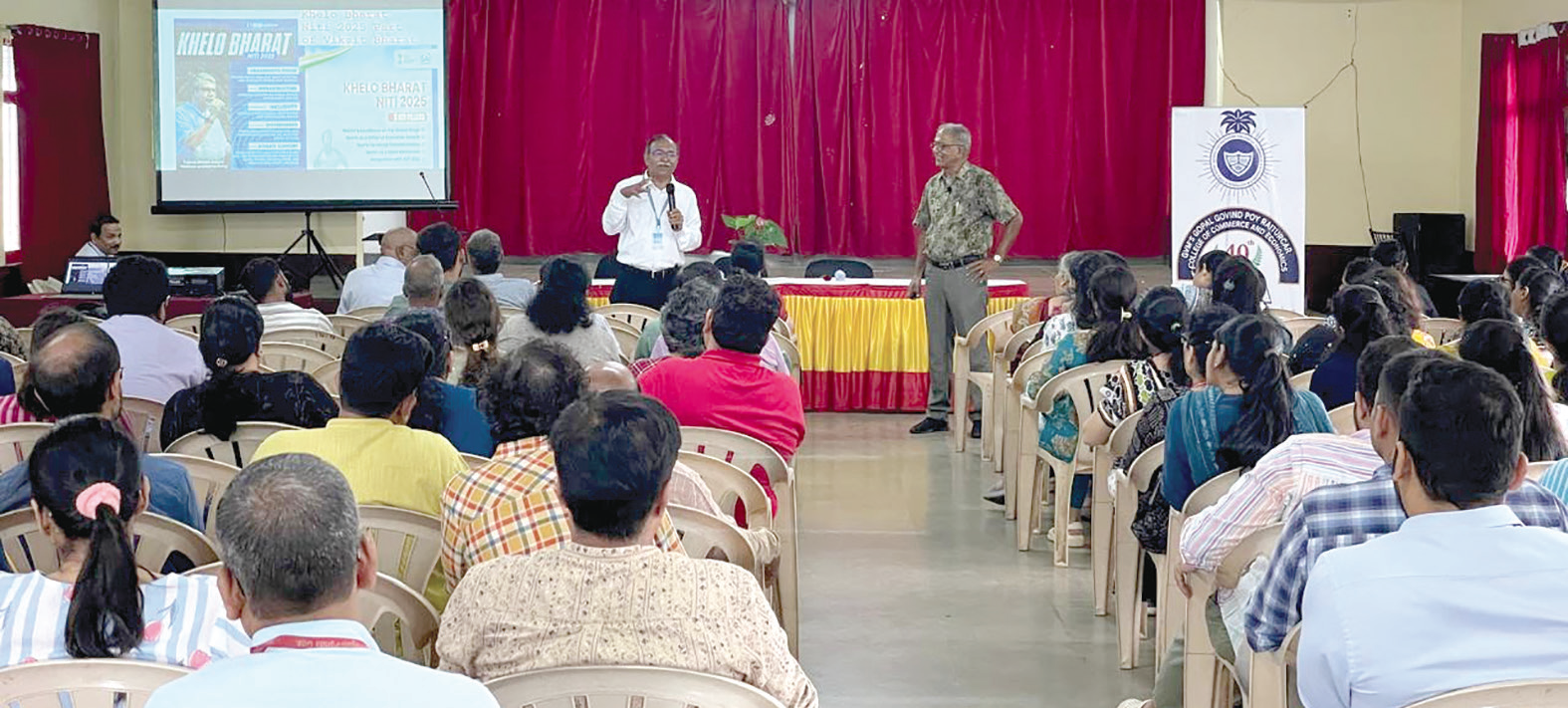

Team Herald
sports@herald-goa.com
PANJIM: Exercise is a crucial component of the National Sports Policy 2025 which aims to promote mass participation in sports and physical activity, recognising that regular exercise contributes to a healthier nation with improved physical and mental well-being.
The policy also emphasises the development of sports infrastructure, training, and coaching to support athletes and encourage participation at all levels, stated senior journalist and former sports administrator, Jovito Lopes at the GVM College, Ponda, recently.
The faculty members of GVM’s Gopal Govid Poy Raiturcar College of Commerce and Economics, Dr Dada Vaidya College of Education, SNJ Aguiar School, Ponda, were informed that the National Sports Policy (NSP), which was approved by Union Cabinet on July 1, aimed to create a society where sports and physical education is valued and integrated into daily life, promoting social inclusion, teamwork, discipline and resilience as part of peoples' movement and integration with National Education Policy 2020.
“The main objective of the Khelo Bharat Niti (NSP) is to build a healthy and active society. Something that people will enjoy and continue to do in the future, emphasising that physical activity is important for overall development and raising health standards. There is a strong link between sports, physical activity and overall health. Research focuses on the negative health consequences of sedentary lifestyles including increased risk of chronic diseases and premature death,” Lopes highlighted.
“While a significant number of children and young people exceed recommended screen time, most of the adolescents do not meet physical activity guidelines. Very few adults are meeting guidelines for the recommended daily intake of fruits and vegetables. Besides, a high proportion of total daily energy intake comes for unhealthy foods and drinks, such as soft drinks, cakes and muffins, chocolate, fried potato products, ice cream, confectionery, energy bars, potato chips, sports and energy drinks, sweet biscuits and pastries. And, most adults do not meet guidelines for physical activity,” he stressed.
Adults from 18-64 were advised to be active most of the days accumulating 150 to 300 minutes of modern intensity physical activity or 75 to 150 minutes of vigorous intensity physical activity per week and also do muscle strengthening activities at least twice each week.
Staying physically active cuts risk of early death by nearly 40 per cent, it’s never too late to become active and taking up exercise at any point throughout adulthood and extend lifespan. It is never too late to start being active, the participants were advised.
Any activity is beneficial and can have lasting effects. Physical inactivity is the fourth leading risk factor for mortality globally and is linked to various non-communicable diseases. People who kept up regular activity were much less likely to die from heart issues. A study published in the recent British Journal of Sports Medicine found that every extra step above 2,200 steps a day - upto about 10,000 - reduces the risk of heart diseases and early death regardless of how much of the remaining time is spent sitting. The study concluded that between 9,000 and 10,500 steps a day cut the risk of early death by 39 per cent and the risk of a heart attack or stroke by over a fifth. It also observed that half of the benefit was achieved at between 4,000 and 4,500 steps a day.
While research found strong links between physical activity and cardiovascular diseases (40 per cent), there were also benefits for cancer risk (25 per cent). Physical activity or regular exercise also helps prevent obesity and Type 2 diabetes, which are significant risk factors for heart disease. It can also lower blood pressure. It boosts mental health and lowers risk of cognitive decline.
Quoting sports medicine expert, Dr Bert Mandelboum, MD, Lopes stated that exercise is probable the most robust drug that we have. It leads to longevity.
The session, held under the banner of Karuna Football Foundation (Ponda) in association with Civitas (Panjim), was attended by Krishna Shetye, chairman GVM’s Working Committee; Dr Teotone Vaz, principal, College of Commerce and Economics; Dr Jojen Mathew, principal, Dr Vaidya College of Education; Geeta Shastri, principal Aguiar HS; Betty D’Silva, PE director; Kennedy D’Silva and Felicio Fernandes, Civitas Treasurer.
Prof Teotone, in his welcome address, highlighted that the faculties of three institutions had readily agreed to participate in the session as it was aimed at promoting their overall well-being. Prof Jojen stressed the need to spot talent with a robust grassroots programme and having outdoor fitness equipment in open spaces, parks like those found in Vietnam and several other countries.